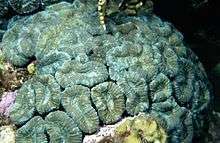Mussa angulosa
| Mussa angulosa | |
|---|---|
 | |
| Scientific classification | |
| Kingdom: | Animalia |
| Phylum: | Cnidaria |
| Class: | Anthozoa |
| Order: | Scleractinia |
| Family: | Mussidae |
| Genus: | Mussa |
| Species: | M. angulosa |
| Binomial name | |
| Mussa angulosa Pallas 1766[2] | |
Mussa angulosa, the spiny flower coral or large flower coral, is a species of stony coral in the family Mussidae. It occurs on reefs in shallow waters in the Caribbean Sea, the Bahamas and the Gulf of Mexico.
Description
Mussa angulosa is a colonial species and the whole clump forms a low dome that may reach 50 centimetres (20 in) across. The individual polyps are very large, sometimes reaching a length of 12 centimetres (4.7 in) and a diameter of 4 centimetres (1.6 in). They completely obscure the short branches of the stony skeleton on which they occur. During the day the polyps appear fleshy, but during the night they expand further and each is fringed by a rim of short tentacles. The colour of the polyps is variable, being grey or pale brown with green, pink and purple shades.[3][4] The tissues of this coral contain symbiotic single-celled algae called zooxanthellae. These are photosynthetic and absorb energy from the sun to create organic compounds which are used by the coral.[2]
Distribution
Mussa angulosa occurs in the Caribbean Sea, the Gulf of Mexico and the Bahamas, and on reefs and banks off the coast of Texas and southern Florida. It is found in water between 3 and 60 metres (10 and 197 ft) deep but most often between 10 and 30 metres (33 and 98 ft).[5]
Biology
Mussa angulosa is a reef-building species and is aggressive, attacking other fast-growing corals that start to grow close by and threaten to overgrow it or shade it.[3] Its cnidocytes are so powerful that no other Caribbean corals can successfully attack it.[3] It leans away from the current as it grows and reacts adversely to increased sedimentation.[5]
Status
There are no specific threats facing this coral and the IUCN Red List of Threatened Species lists it as being of "Least Concern". It is however probably declining because of the degradation of coral reefs by mechanical damage, climate change and ocean acidification. It is susceptible to coral bleaching and the coral diseases that affect stressed corals. Off the coasts of the United States it is present in various marine parks and other conservation areas, in both of which it is protected.[1]
References
- 1 2 Aronson, R.; Bruckner, A.; Moore, J.; Precht, B.; Weil, E. (2008). "Mussa angulosa". IUCN 2012. IUCN Red List of Threatened Species. Version 2012.2. Retrieved 2012-10-19.
- 1 2 van der Land, Jacob (2012). "Mussa angulosa Pallas". World Register of Marine Species. Retrieved 2012-10-19.
- 1 2 3 Colin, Patrick L. (1978). Marine Invertebrates and Plants of the Living Reef. T.F.H. Publications. p. 270–274. ISBN 0-86622-875-6.
- ↑ "Mussa angulosa (Pallas 1766)". Coralpedia. Retrieved 2012-10-19.
- 1 2 "Mussa angulosa (Pallas 1766)". NatureServe Explorer. July 2012. Retrieved 2012-10-19.
